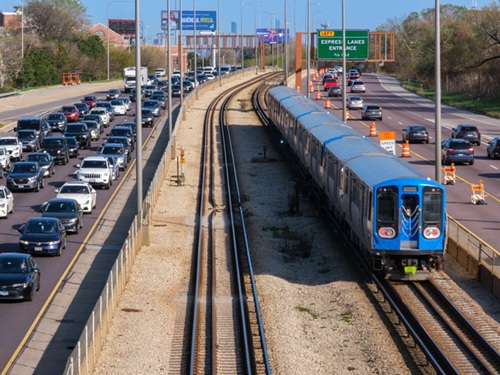The Federal Highway Administration recently unveiled two new efforts established by the $1.2 trillion Infrastructure Investment and Jobs Act or IIJA enacted in November 2021 that aim to help create economic opportunities and open the door to building generational wealth for disadvantaged entrepreneurs and workers across the country.
[Above photo of FHWA Administrator Shailen Bhatt via the FHWA]
Those efforts include: New guidance to support state investment in workforce development, training, and education to help rebuild the nation’s infrastructure; and $10 million to support small businesses owned by minorities, women, and other socially and economically disadvantaged individuals, through FHWA’s Disadvantaged Business Enterprise Supportive Services or DBE/SS funding.

“To realize the potential of [the IIJA] package, we must both provide disadvantaged businesses a chance to grow and train a workforce that meets tomorrow’s challenges,” explained recently-confirmed FHWA Administrator Shailen Bhatt in a statement.
“The historic funding being provided for workforce development, training and education activities, coupled with the guidance we’re announcing today, will help provide economic opportunities to millions of talented people who will help deliver bridge, road and highway projects that will make travel safer and more efficient for communities across this country in the generation to come,” he said.
Under the IIJA, workforce development-related activities are funded at 100 percent federal share, and Bhatt said FHWA’s new guidance provides clarity about which federal-aid formula funds can be used by state departments of transportation and U.S. territories to support workforce development including training, education, and registered apprenticeship.

Additionally, the IIJA also expands the types of activities eligible to be paid for using formula funding to include programs that provide recruiting, counseling, transportation, remedial training, and childcare services; education-related activities such as commercial driver license training, work-study and scholarship programs; and internships and skills development training programs.
The FHWA is also allocating $10 million in fiscal year 2022 DBE/SS program funding to 47 state DOTs, including the District of Columbia, Puerto Rico, and the U.S. Virgin Islands. The IIJA provides $50 million in funding for the DBE/SS program through 2026, which will allow participating states to provide training and business development services to eligible small businesses to improve their ability to compete as prime and subcontractors on federally assisted contracts.
State DOTs across the country are already involved in a number of efforts to support DBE activity in the transportation sector.
For example, in October 2022, six state DOT chief executives signed a national pledge at a ceremony in the nation’s capital as part of their commitment to expand equity opportunities in the infrastructure sector.
Those state DOTs – representing California, the District of Columbia, Illinois, Kansas, Louisiana, and Michigan – pledged to create opportunities for historically underutilized businesses or HUBs as they disburse IIJA funds.
“This pledge helps create more prime contracting opportunities,” noted Shawn Wilson, Ph. D., secretary of the Louisiana Department of Transportation and Development and immediate past president of the American Association of State Highway and Transportation Officials, at that event.
“From an economic development perspective, from a workforce perspective, and from a doing-what-is-right perspective, this is why signing this equity in infrastructure pledge is important,” he said.
AASHTO is also broadly supporting an effort launched by the U.S. Department of Transportation in 2022 to modernize its DBE and airport concession disadvantaged business enterprise (ACDBE) programs. In a letter to USDOT sent in October 2022, AASHTO expressed its broad support for the agency’s effort to modernize those two programs and offered several suggestions to make them more effective.
 Nation
Nation


